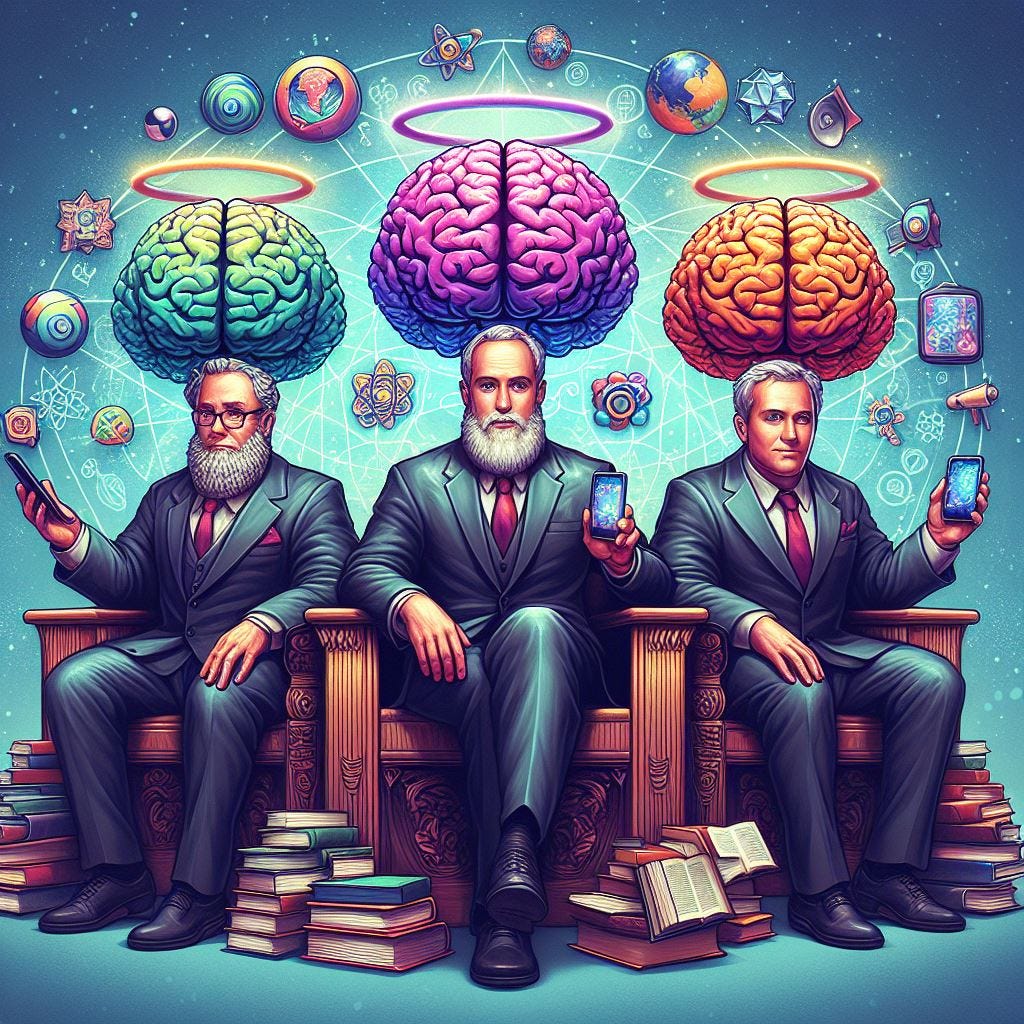I have now finished watching The Psychological Drivers of the Metacrisis: John Vervaeke Iain McGilchrist Daniel Schmachtenberger, all three hours and twenty minutes of this extraordinary video. It took me three sessions over the past three days and it was time well spent. These three men are what we affectionately call galaxy brains, giants in the SPACE.
The transcript of the video is seventy-two pages long. I am going to select a few bits and pieces that I would like to specifically comment on. But all of it resonated strongly with me, a metamodern vibe from start to finish.
As background, it is necessary to undertand The Master and His Emissary
In "The Divided Brain", McGilchrist digests study after study, replacing the popular and superficial notion of the hemispheres as respectively logical and creative in nature with the idea that they pay attention in fundamentally different ways, the left being detail-oriented, the right being whole-oriented. These two modes of perception cascade into wildly different hemispheric personalities, and in fact reflect yet a further asymmetry in their status, that of the right's more immediate relationship with physical bodies (our own as well as others) and external reality as represented by the senses, a relationship that makes it the mediator, the first and last stop, of all experience.
As I listened to the conversation, I wondered if a feminine/masculine lens would add something of value and I was pleased when Schmachtenberger tried to go in that direction.
[02:43:04:05] Schmachtenberger: Yes. And there's something about also at the small scale. Like, we're talking, we’re having a conversation, a lot of people are going to get to see. But we're not necessarily taking people through a practice that is inducing the kinds of states, the right-hemispheric state where the 56 numinous is there, right? Where the sacred is there, where the intimacy is there, and I don't want to violate something I'm intimate with. You know, there's something about the small-scale that has high intimacy, high touch in which I'm not relating to the abstract concept of, “They're Christians. They're on my side. They're not Hindus on the other side,” or whatever. I'm relating to this unique person and this one and this one here that is inherently, I think, hemispherically different. I was also thinking about—so I'm curious how much you see hemispheric dominance having to do with scaling, is one question. I'm also very curious about—and I've had other friends want to ask you this—if matriarchal and matrifocal cultures had any difference in this particular way, given the—is there a evolutionary difference in tending the babies and tending life that orients in this way?
McGilchrist and Vervaeke did not pick up on the point, but I hope others will. McGilchrist focuses on brain functioning. But brains exist in bodies that are different, mostly distinctly female or male. Brains are impacted by hormones which are also very different in women and men.
Is it perhaps more natural for men to be the Master and for women to be the Emissary? Is this perhaps one reason why most leaders are men and why we are in trouble? Is this perhaps a reason why many women are reluctant to lead? Perhaps this suggests a path forward. What if men push women with left brain orientations to become our leaders?
I am also interested in the role of the Sacred in developing solutions to the metacrisis.
[02:20:58:13] Vervaeke: Now, notice what I'm not saying. I'm not saying I'm going to make this. What I’m going to say is, can I get the very best of what drew everything together, draw it together, put it into a living community, living ecologies of practices so that there's a possibility that the sacred could speak to us again? That's what I'm proposing. McGilchrist: I think the sacred is beginning to speak to us again. That's my observation. Vervaeke: Yes
I am also seeing this bubble up eleswhere. As someone who has had a strong secular orientation since midlife, I will need a lot of help from others to understand this better. To help me clarify my thoughts, I hope to write an essay About What is Sacred sometime in 2024.
Related to the Sacred, Vervaeke often talks about the need for a new religion.
[02:11:36:04] Vervaeke: Well, I’ve offered an answer to that I thought.
Schmachtenberger: Okay
Vervaeke: But my proposal is, we need to basically co-opt and exapt the machinery of religion, because religions have been able to do—they've shown that they are proper distributed cognition, collective intelligence machines that can fundamentally reorient at a civilizational level. They have a—they can do that, for good or for ill, right?
[02:12:05:05] And that what we need is something like that. And I'm not proposing that I'm going to start a religion, because that's a ridiculous proposal. But that—so I'm saying, we have done this in the past, and of course, nobody makes a religion. There's an algorithm. There's a way in which—and I'm sort of Heideggerian about this—the sacred has to somehow break through the way the complicated has failed in the face of the complexity of reality and speaks in a new way. And something is called to that. And then we have something like—but it can't be like the Axial religions. It has to be as different to the Axial religions as the Axial religions were to the Bronze Age religions. This is the proposal I’m making.
Vervaeke’s proposal is extremely ambitious but he supports it brilliantly. He often describes how Christianity stole the culture of the Roman Empire. Our culture today is in desparate need of such a transformation.
Personally, I am more drawn to the creation of A New Grand Narrative than a new religion but perhaps that merely reflects my preference for the secular.


